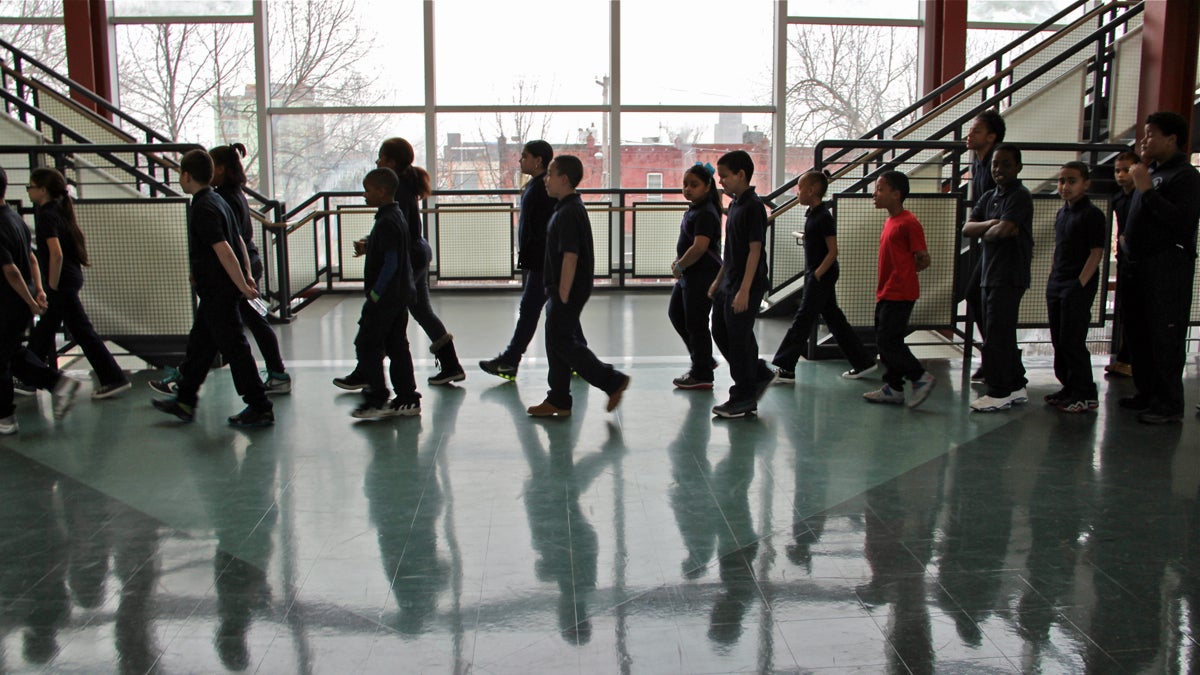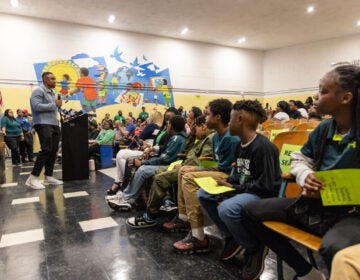Pennsylvania is failing Philly’s schools — so, close the schools?

File image: Students walk the halls at De Burgos Elementary School. (Emma Lee/WHYY)
The Pennsylvania Senate’s effort to amend the PA School Code (H.B. 530), is part of the backroom wrangling over our state budget.
Senate amendments to the bill require the state to directly take over or close five individual schools every year. This Senate incursion into education is a textbook example of aggression and obstruction with no advance intelligence, no input, from “frontline ground troops.” So politicians with uninformed philosophies push more and more state bureaucracy into sectors where the state is ignorant and, in fact, failing.
It is impossible to continue silently enduring simplistic views of learning and teaching practice (by non-practitioners) and simplistic “solution pills” to “fix” or increase learning, which instead continue generating more and more collateral damage: academic damage, systemic damage, financial damage, social damage, personal damage, and more.
Newsflash: There is no simplistic, quick fix, or someone would have done it long ago! In fact, Pennsylvania took over the School District of Philadelphia 15 years ago already! The state’s record of academic decline, and their consistent record of precise underfunding of Philadelphia in particular, is a prime cause of our condition, a contrived disaster.
Ask yourself: After 15 years of state management, is the School District of Philadelphia better off today or worse off?
Now politicians want to go even further? The Senate proposes a required micro-management (or closure) from the state level of the five “worst” schools in Philadelphia. All for the sake of negotiating a state budget?
I ask, “What secret solution does the state have?”
There are no capital programs, no curriculum programs, no books, no supplies, no teacher incentives or punishments, no longer hours, no charter business plans, and no “common core” or “standardized” testing program nor even school closings that start at the center of the learning process. Instead they all focus on the periphery.
The learners, children, are the center. Children are people. It takes highly trained, highly competent people to work with people — with 30 people, in one room, all day, every day, while facilitating learning. Whether we choose to view the truth, or adopt the pol’s simplistic view of people (children and teachers) as ‘widgets’ will determine success and failure.
Learning is a personal process, a complex process. The learning process and its timing for children varies infinitely, as does human experience. Facilitating their learning, or “teaching,” is an art, a practice.
Harder than hard is capturing the attention and the imagination of the incredible range of learners and learning styles that can be found in a typical public school classroom.
As one single example of one key complexity (there are many), children in our public school classrooms have massive rates of trauma, described by our own U.S. Department of Justice report as an “epidemic,” and by past surgeons general as a “national crisis,” years ago! The CDC says it is critical to understand.
There is much to understand. The first thing is that childhood trauma affects every classroom. It is not poverty. It is not an “urban issue.” It is not a “color issue.” The CDC’s own prodigious study was fielded in beautiful, suburban San Diego.
Next, neuroscience tells us it is physiologically impossible to learn for those children in fight-or-flight mode, defending against complex trauma.
Then, research studies show trauma rates as high as English Language Learner (ELL) percentages and as high as those students with Individual Education Plans (IEP) — in some ZIP codes higher than the combination.
Students with IEPs and ELLs are funded and accommodated. Childhood trauma is not.
Trauma-impacted children’s civil right of equal access to an equal quality, public education is being violated by those from afar, without knowledge, without experience. Just one example of complexity.
Keep top of mind that assigning blame is irrelevant. We are talking about public education. The concept of “public” is equal access to the same quality for all. All! The children are coming to our classrooms in a few hours, no matter who is at fault for what.
We need training and resources and strategies and support to teach all children all the time. Putting the state more directly in charge has not — and will not — solve anything.
Ask non-practitioner politicians to keep simplistic, academic “fixes” to themselves. Their political focus is better served protecting civil rights of children denied equal access.
We are public education. Stop shooting at us. Join with us.
—
Daun Kauffman teaches in North Philadelphia public schools and blogs at LucidWitness.com. He lives in Hunting Park where he has served the children and families for 15 years. Kauffman has an M.Ed. from Temple University and an MBA from Harvard University Graduate School of Business.
WHYY is your source for fact-based, in-depth journalism and information. As a nonprofit organization, we rely on financial support from readers like you. Please give today.





